外研版(一起)五上Module 6《Unit 1 You can play basketball well》ppt课件4
河南省平顶山市四小五年级英语上册Module6Unit1Youcanplayfootballwell
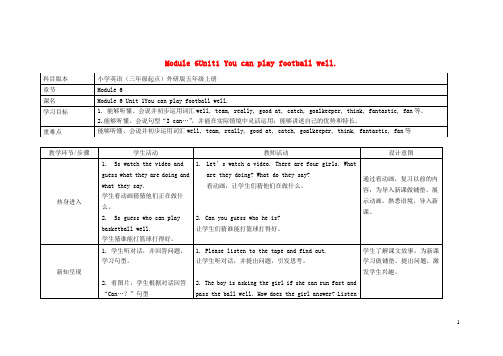
Module 6Unit1 You can play football well.12He can very fast1。
能掌握字母组合cl和pl的发音规那么,并能正确拼读Let’s spell局部的例词. 2。
能根据字母组合cl和pl的发音规那么拼读、拼写其他类似的单词。
掌握字母组合cl和pl的发音规那么。
正确拼读Let's spell中的单词并总结规律.教学光盘,单词卡片。
Step 1:Warm—up1.Sing a song: My weekend。
2。
Review the words in this unit。
让学生看课本中图片说单词.3.利用卡片复习句子:T:What do you do on the weekend?Ss:I often…/I usually…/Sometimes I …多请几组学生操练或者学生分小组操练。
Step 2:Presentation1。
Listen and repeat(PPT〕.教师教读clean.2。
指名读,并请发音标准的学生领读clean。
3.用开火车读、比赛读等多种方式练读clean。
4.以同样的方式学习clock class clever。
5。
找规律:clean clock class clever /cl/(板书〕6.以同样的方式学习plate eggplant please play /pl/〔板书〕7.找学生读,进一步纠正发音。
多种形式练读所有单词,如开火车读、声音上下读等。
8。
找学生认读单词。
教师讲评错误较多的单词并纠正发音。
9.教师示范写单词,学生练习写单词.Step 3: Consolidation and extension1。
找一找,读一读含有字母组合cl和 pl的单词。
2。
游戏:出示P6的单词表,两名学生一组,一名学生读单词,另一名学生指出所读单词,对表现好的小组给予奖励。
Step 4: Homework搜集有同样发音规律的单词,每种不少于三个。
外研版(三起点)小学五年级英语上册Module6_Unit1_ 优课教案
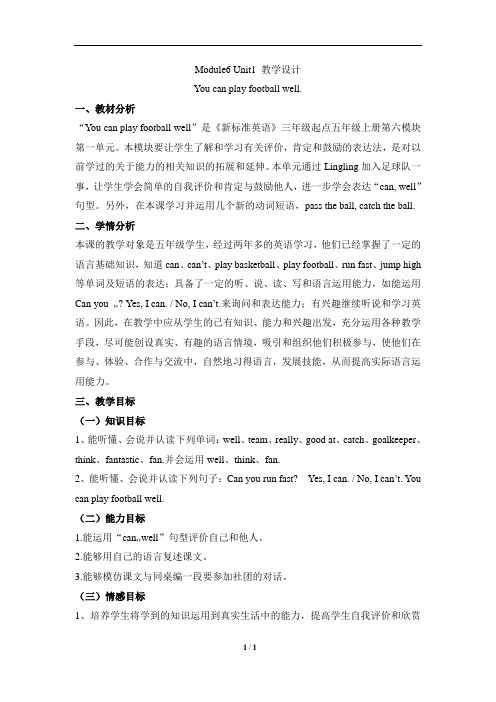
Module6 Unit1 教学设计You can play football well.一、教材分析“You can play football well”是《新标准英语》三年级起点五年级上册第六模块第一单元。
本模块要让学生了解和学习有关评价,肯定和鼓励的表达法,是对以前学过的关于能力的相关知识的拓展和延伸。
本单元通过Lingling加入足球队一事,让学生学会简单的自我评价和肯定与鼓励他人,进一步学会表达“can, well”句型。
另外,在本课学习并运用几个新的动词短语,pass the ball, catch the ball.二、学情分析本课的教学对象是五年级学生,经过两年多的英语学习,他们已经掌握了一定的语言基础知识,知道can、can’t、play basketball、play football、run fast、jump high 等单词及短语的表达;具备了一定的听、说、读、写和语言运用能力,如能运用Can you …? Yes, I can. / No, I can’t.来询问和表达能力;有兴趣继续听说和学习英语。
因此,在教学中应从学生的已有知识、能力和兴趣出发,充分运用各种教学手段,尽可能创设真实、有趣的语言情境,吸引和组织他们积极参与,使他们在参与、体验、合作与交流中,自然地习得语言,发展技能,从而提高实际语言运用能力。
三、教学目标(一)知识目标1、能听懂、会说并认读下列单词:well、team、really、good at、catch、goalkeeper、think、fantastic、fan.并会运用well、think、fan.2、能听懂、会说并认读下列句子:Can you run fast? Yes, I can. / No, I can’t. You can play football well.(二)能力目标1.能运用“can…well”句型评价自己和他人。
2.能够用自己的语言复述课文。
新标准小学英语第五册(三年级起)Module 6 Unit 1 You can play football well.教学设计和反思

新标准小学英语第五册(三年级起)Module 6 Unit 1 You can play football well.教学设计和反思新标准小学英语第五册(三年级起)Module 6 Unit 1 You can play football well.教学设计和反思“You can play football well”是《新标准英语》第五册第六模块第一单元。
本模块要让学生了解和学习有关评价,肯定和鼓励的表达法,是对以前学过的关于能力的相关知识的拓展和延伸。
本单元通过Lingling加入足球队一事,让学生学会简单的自我评价和肯定与鼓励他人,进一步学会表达I can…well,You can…well.另外,在本课学习并运用几个新的动词短语,control the ball catch the ball.学情分析五年级大部份学生以前学会了run fast jump high jump far play football play basketball play table-tennis等动词短语,由于长时间没有温故而新,部份学生已遗忘了,这给本课的学习带来一定的困难,需3—5分钟复习。
我校学生没有踢足球的场地,但下周即将举行篮球赛,所以将Do you want to be in our football team?换成:Do you want to be in our basketball team?这样话题的选择更贴进学生的生活实际,学生的学习激情更高些。
教学目标1、认知目标(1)能听懂会说一些有关体育运动的动词短语。
(2)能熟练掌握句型:“Can you…?”并根据自己实际回答“Yes,I can.”或“No,I can’t”.能熟练运用句型:“I/You can play football well.”2、能力目标培养学生用英语进行交流的能力,学会评价自己和他人。
3、情感目标激发学生的学习兴趣。
外研版(一起)二年级英语上册教案Module6Unit1(1)

外研版(一起)二年级英语上册教案Module 6 Unit 1 She watches TV一、教学目标(一)知识技能目标:1. 懂、会读、会说、会写单词weekend, read ,come, with。
2. 能听懂、会读、会写句子Have a good weekend .Do you play football at the weekend? She goes swimming .She watches TV and she reads books.(二)运用能力目标:1. 学习怎样用英语陈述某人经常做的事情;向朋友介绍自己的家人经常做的事情,掌握相关单词和句型,并能综合运用新、旧知识组织对话完成一定的交际任务。
2. 增加已学知识的复现率,培养学生对重点单词和句子的认读能力(三)素质教育目标:1.培养学生浓厚的英语学习兴趣,积极参与说英语、做游戏等实践活动。
2.帮助学生树立较强的自信心,培养学生乐于与他人合作的精神与竞争意识。
二、教学重点1.能够用英语陈述某人经常做的事情,向朋友介绍自己的家人经常做的事情。
2.能听懂、会说、会读以下句子:Have a good weekend.Do you play football at the weekend?She watches TV and she reads books.并能进行扩展,在实际生活中灵活运用。
三、教学难点1.熟练掌握本单元的单词和句型,能在实际生活中灵活运用。
2创设英语情景,使学生正确运用所学知识用英语描述近来经常进行的活动。
四、教学意图1.培养学生对重点词汇和句子的认读能力。
2.培养学生的听说能力。
3.激发学生的求知欲,创设各种真实或接近真实的语言环境,让学生积极参与体验。
五、教具准备1.教材相配套的教学挂图,录音。
2.单词卡片。
3.准备小奖品。
六、教学过程Step 1.Warming-up1. Greeting: Say hello to the student.2. Let’s chant.教师放第二册Module 7Unit2的儿歌。
Module6 Unit1You can play football well. 说课稿
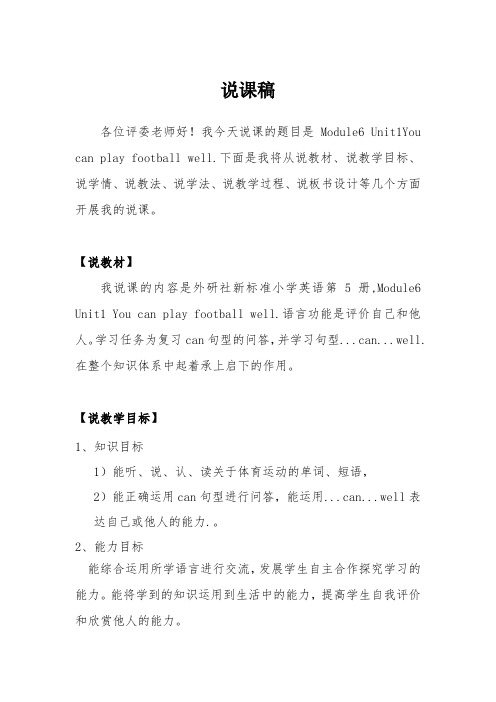
说课稿各位评委老师好!我今天说课的题目是Module6 Unit1You can play football well.下面是我将从说教材、说教学目标、说学情、说教法、说学法、说教学过程、说板书设计等几个方面开展我的说课。
【说教材】我说课的内容是外研社新标准小学英语第5册,Module6 Unit1 You can play football well.语言功能是评价自己和他人。
学习任务为复习can句型的问答,并学习句型...can...well. 在整个知识体系中起着承上启下的作用。
【说教学目标】1、知识目标1)能听、说、认、读关于体育运动的单词、短语,2)能正确运用can句型进行问答,能运用...can...well表达自己或他人的能力.。
2、能力目标能综合运用所学语言进行交流,发展学生自主合作探究学习的能力。
能将学到的知识运用到生活中的能力,提高学生自我评价和欣赏他人的能力。
3、情感态度和价值目标激发学生学习英语的兴趣,提高学生自我评价和欣赏他人的能力,培养学生爱生活爱运动的健康理念。
4.教学重难点重点:1)能听、说、认、读四会单词: catch,really,fantastic 等,并掌握与运动相关的单词和短语;2)能正确运用本课所学句型 Can you…?的问答难点:能运用“can…well”句型评价自己和他人。
【说学情】1、现有的认知结构本课的教学对象是五年级学生,经过两年的多的英语学习,他们已经掌握了一定的语言基础知识,具备了一定的听、说、读、写和语言运用能力,有兴趣继续听说和学习英语。
2、学生的认知特点:五年级的学生一般为10-11岁,活泼好动,已从具体形象思维向抽象逻辑思维过度,但仍具有很大成分的具体形象性,习惯于模仿,所以需要结合情境教学、启发式教学、任务教学等教学方法。
【说教法】《英语课堂标准》指出,基础教育阶段英语课程的主要目的是培养和激发学生学习英语的习趣,树立学生的自信心。
外研版小学英语五年级上册教案(精选10篇)
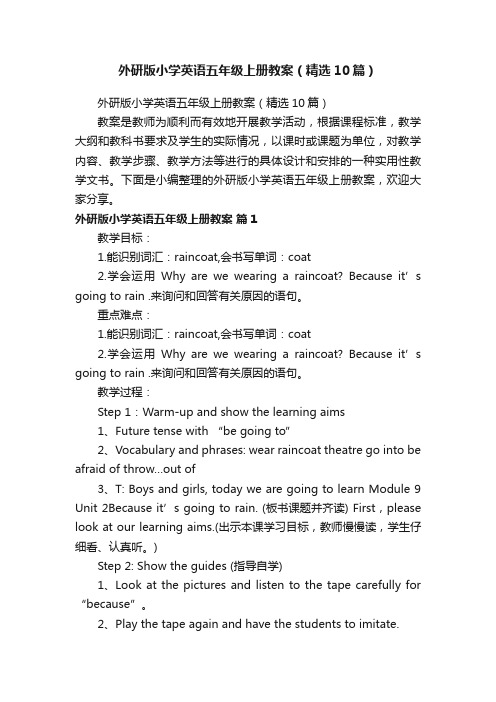
外研版小学英语五年级上册教案(精选10篇)外研版小学英语五年级上册教案(精选10篇)教案是教师为顺利而有效地开展教学活动,根据课程标准,教学大纲和教科书要求及学生的实际情况,以课时或课题为单位,对教学内容、教学步骤、教学方法等进行的具体设计和安排的一种实用性教学文书。
下面是小编整理的外研版小学英语五年级上册教案,欢迎大家分享。
外研版小学英语五年级上册教案篇1教学目标:1.能识别词汇:raincoat,会书写单词:coat2.学会运用Why are we wearing a raincoat? Because it’s going to rain .来询问和回答有关原因的语句。
重点难点:1.能识别词汇:raincoat,会书写单词:coat2.学会运用Why are we wearing a raincoat? Because it’s going to rain .来询问和回答有关原因的语句。
教学过程:Step 1:Warm-up and show the learning aims1、Future tense with “be going to”2、Vocabulary and phrases: wear raincoat theatre go into be afraid of throw…out of3、T: Boys and girls, today we are going to learn Module 9 Unit 2Because it’s going to rain. (板书课题并齐读) First,please look at our learning aims.(出示本课学习目标,教师慢慢读,学生仔细看、认真听。
)Step 2: Show the guides (指导自学)1、Look at the pictures and listen to the tape carefully for “because”。
外研版英语(一起)五年级上册 Module 6教案

通过图片回答问题,并且学习了well的含义Look at the pictures and say.Messi can play football well.She can play the flute well.Sun yang can swim well.Yang Liping can dance well.Lang lang can play the piano well.2.Questions:What can you do well?I can...well.What can’t you do well?I can’t...well.The leopard can run fast.Liu Xiang can run fast, too.He can jump high.He can jump far.复习high和far 用法。
2.Watch and listen(1)Watch the video(活动一), and findWhat can the birds do?The birds can fly fast.The birds can fly high.(2)Watch the video(活动二), and findCan Lingling play basketball well?Yes, she can.通过观看视频,初步了解对话背景内容。
3.Listen and find the questions:Make an assessment for Lingling with can, can’t, fast, high, wellThere are two teams.Chinese basketball team American basketball team课题Module6 Revision学习目标1.会正确认读、听说单词seventy sixty;2.能准确朗读课文。
外研版第五册 五年级上册3~10模块短语知识点
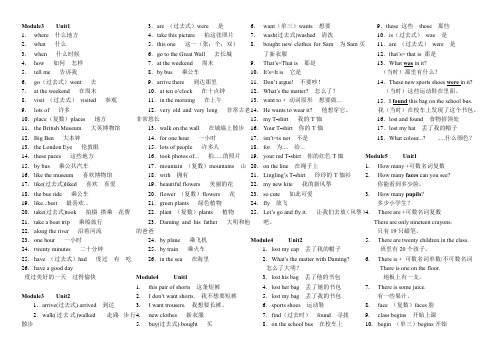
Module3 Unit11.where 什么地方2.what 什么3.when 什么时候4.how 如何怎样5.tell me 告诉我6.go(过去式)went 去7.at the weekend 在周末8.visit (过去式)visited 参观9.lots of 许多10.place(复数)places 地方11.the British Museum 大英博物馆12.Big Ben 大本钟13.the London Eye 伦敦眼14.these paces 这些地方15.by bus 乘公共汽车16.like the museum 喜欢博物馆17.like(过去式)liked 喜欢喜爱18.the bus ride 乘公车19.like...best 最喜欢...20.take(过去式)took 拍摄搭乘花费21.take a boat trip 乘船旅行22.along the river 沿着河流23.one hour 一小时24.twenty minutes 二十分钟25.have (过去式)had 度过有吃26.have a good day度过美好的一天过得愉快Module3 Unit21.arrive(过去式) arrived 到达2.walk(过去式)walked 走路步行散步3.are (过去式)were 是4.take this picture 拍这张照片5.this one 这一(张;个;双)6.go to the Great Wall 去长城7.at the weekend 周末8.by bus 乘公车9.arrive there 到达那里10.at ten o’clock 在十点钟11.in the morning 在上午12.very old and very long 非常古老非常悠长13.walk on the wall 在城墙上散步14.for one hour 一小时15.lots of people 许多人16.took photos of... 拍......的照片17.mountain (复数)mountains 山18.with 拥有19.beautiful flowers 美丽的花20.flower (复数)flowers 花21.green plants 绿色植物22.plant (复数)plants 植物23.Daming and his father 大明和他的爸爸24.by plane 乘飞机25.by train 乘火车26.in the sea 在海里Module4 Unit11.this pair of shorts 这条短裤2.I don’t want shorts. 我不想要短裤3.I want trousers. 我想要长裤。
小学英语外研版五年级下册模块知识点
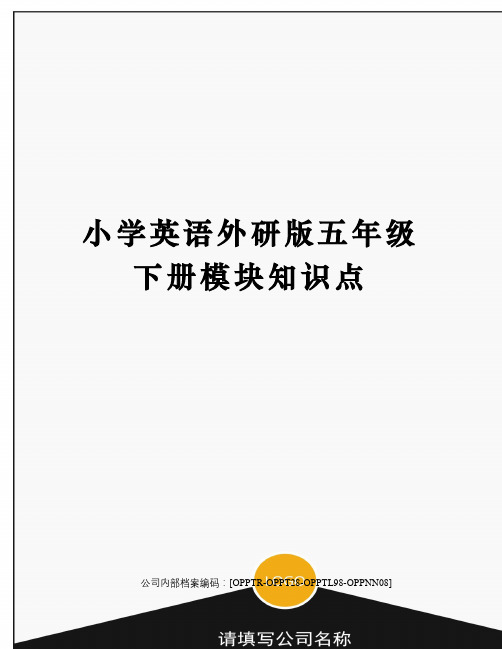
小学英语外研版五年级下册模块知识点公司内部档案编码:[OPPTR-OPPT28-OPPTL98-OPPNN08]Module 1 Unit 1重点句子:1.She was young in this picture.她在这张照片里很年轻.否定句:She wasn’t young in this picture.一般疑问句:Was she young in this picture2. She was a driver before.她以前是一个司机.否定句:She wasn’t a driver before.一般疑问句:Was she a driver before肯定回答:Yes, she was. / No, she wasn’t.就划线部分提问:What was she before3.He played Chinese music.他演奏中国音乐.否定句:He didn’t play Chinese music.一般疑问句:Did he play Chinese music肯定回答:Yes, he did. / No, he didn’t.就划线部分提问:What music did he play4.I can play the flute, too. = I can also play the flute.我也会演奏笛子.5. She drove a bus.她开公共汽车.就划线部分提问:What did she drive6. He teaches us English.他教我们英语.就划线部分提问:What does he teach us7. She helped children.她帮助了孩子们.就划线部分提问:What did she do重点单词:1. grandma2. picture祖母,奶奶图片,照片3. player 玩家,演奏者,运动员,演员Module 1 Unit 2重点句子:1.My grandpa worked in an office.他在办公室工作.否定句:My grandpa didn’t work in an office.一般疑问句:Did your grandpa work in an office肯定回答:Yes, he did. / No, he didn’t.就划线部分提问:Where did your grandpa work2.My mother works in a hospital.我(de)妈妈在医院上班.否定句:My mother doesn’t work in a hospital.一般疑问句:Does your mother work in a hospital 肯定回答:Yes, she does. / No, she doesn’t.就划线部分提问:Where does your mother work3.My parents work in a factory否定句:My parents don’t work in a factory.一般疑问句:Do your parents work in a factory肯定回答:Yes, they do. / No, they don’t.就划线部分提问:Where do your parents work4.There were no computers like there are today.过去不像今天这样,有电脑.5. I was a teacher before.就划线部分提问:What were you before重点单词和短语:1. office2. factory3. hospital办公室工厂医院4. parents 6. shop 7. in the sun父母商店在阳光下very hard工作非常努力Module 2 Unit 1重点句子:1.I’ve got an email from Lingling. 我收到玲玲发(de)一封电子邮件.2.It’s about English food. 它是关于英国食物(de).3.Yesterday she had an English breakfast. 昨天她吃了一顿英国式早餐.4.She had eggs and sausages for breakfast. 她早餐吃了鸡蛋和香肠.否定句:She didn’t have eggs and sausages.一般疑问句:Did she have eggs and sausages肯定回答:Yes, she did. / No, she didn’t.就划线部分提问:What did she have for breakfast5.It’s a traditional English dinner. 它是一顿传统(de)英国式晚餐.6.She says it’s delicious.否定句:She doesn’t say it’s delicious.一般疑问句:Does she say it’s delicious肯定回答:Yes, she does. / No, she doesn’t.就划线部分提问:What does she say重点单词:1. email2. food3. breakfast4. lunch电子邮件食物(不可数)早餐午餐5. dinner6. sausages7. sandwiches8. chips晚餐香肠三明治薯条9. traditional 10. delicious 11. different传统(de)好吃(de)不同(de)Module 2 Unit 2重点句子:1.English people usually have breakfast at seven o’clock. 英国人通常在7点钟吃早餐.就划线部分提问:What time do English people usually have breakfast2.Sundays are special in England. 在英国每周日是很特别(de).3.Families usually eat lunch together. 家人们通常一起吃午餐.4.They eat chicken, potatoes and vegetables. 他们吃鸡肉,土豆和蔬菜.5.On Fridays, many people eat fish. 在每个周五,许多人吃鱼.6.He has dinner at half past twelve.就划线部分提问:What time does he have dinner7.She has biscuits and noodles.What did she have重点单词:1. England2. usually3. special4. families英国通常特别(de) family(de)复数5. together6. chicken7. potatoes8. vegetable一起鸡,鸡肉 potato(de)负数蔬菜9. want to do sth.想要做某事.10.food食物/ meat肉/ fish鱼肉/ chicken鸡肉这几个词都是不可数名词.Module 3 Unit 1Wordsreturn 归还 computer计算机,电脑 like 喜欢card 卡片,名片 week 星期,周video 录像,视频 shelf架子library 图书馆favourite 特别喜欢(de) return 归还Phrasein China 在中国 on the computer 在电脑上at the library 在图书馆in two weeks 在两周内 library card 借书卡 on shelf 在书架上lend…to… 把…借给…borrow…from… 从…借入本课语法点1. have got/haven’t gothave got是表示“有”(de)意思;什么时候用have got,什么时候用has got 取决于主语,如果主语是第三人称单数,就用has got,其它(de)就用have got.如果要对have/has got表示否定,只须在have/has后加上not即可,have not可以缩写成haven’t;has not可以缩写成hasn‘t.2.Have…got /Yes/NoHave got(de)—般疑问句是: Have/Has sb got…如: Have you got a sandwich你有一块三明治吗具体是用have还是用has就由sb(de)人称决定. Have you got…是—般疑问句,回答要用yes和no.Module 3 Unit 2Wordsborrow 借入;借来zoo动物园 wear 穿着bookshop 书店 school 学校 talk 谈话,讲话hear 听说,听到park 公园 friend 朋友type n.类型,品种 v.打字Phraselots of 很多,大量 talk to sb. 对某人说话use the computer 使用电脑 borrow books借书do your homework 做你(de)家庭作业English libraries 英国(de)图书馆in a library 在一个图书馆 so much 如此多talk to your friends 和你(de)朋友们交谈lots of stories 很多故事本课语法点1. can/can’tcan是情态动词,这里表示“能,会”(de)意思,用来表示能力,后面接上动词原形,这一点同学们要记住哦.情态动词“can“可以用来表示“会……”,can‘t表示“不会……”(de)意思.2. 学习部分介词(de)用法with是介词,可以表示“用”(de)意思;with还有“和…一起”(de)意思.with后面可以加工具类(de)名词,例如:Cut it with a knife.(用刀切开它.)工具、器具、材料类(de)名词都和with这个介词搭配,表示“用(某种工具)……”.介词for后面接某人,表示动作(de)对象或者接受者,意思是“给……”、“对……(而言)”.当我们表达几点钟(de)时候,我们必须用at.“in”和“at”(de)区别:在英语中at和in都可以作为表示场所(de)介词,但是at表示某地点(表示比较小或狭窄(de)场所),而in表示在某地(表示比较大或宽敞(de)场所)Module 4 Unit 1Wordsfine(身体)很好 sent (send(de)过去式)寄get 收到;接到chocolate 巧克力read 读game游戏 ate (eat(de)过去式)delicious 美味(de) America 美国Phrasecome to 来到 live in 在……居住 last week 上星期a Maths game 一个数学游戏English books 英语书my chocolate 我(de)巧克力 send you 寄给你some books 一些书 this summer 这个夏天本课语法点1.Did…一般过去时(de)一般疑问句.一般疑问句中要用到助动词did,把did提至句首,其他句子结构保持不变.另外,一般疑问句中(de)行为动词也要用原形表示.—般过去时一般疑问句(de)回答.用Yes,…/N0,…来回答,助动词要用did,以保证问句答句时态一致.2.宾格it/them人称代词(de)宾格有:me,us,you,her,him,it,them等.宾格用在动词和介词之后.Module 4 Unit 2Wordsseason 季节 birthday 生日 winter冬天spring 春天 summer 夏天July七月August 八月leaf 树叶 temperature温度,体温 autumn 秋天 sandal 凉鞋 wood 木头,木材glove手套 breeze 微风Phrasefavourite season 最喜爱(de)季节smell good 闻起来味道很好 in the sky 在天空中go swimming 去游泳 play with玩…..,和……一起玩a breeze 一阵微风 fall off 从……跌落in the wood 在树林里 on the tree 在树上(长在树上)in the tree 在树上(不长在树上)the baby ducks 小鸭子们本课语法点1.What is…favorite…What’s your favorite… 这个句型可以用来询问别人最喜欢(de)东西是什么. 2.季节(de)学习3.When…when是特殊疑问词,等于what time,是用来提问时间.what time只用于询问钟点,而when可以用来询问日期、钟点、星期几等.Module 5 Unit 1Wordsbroken 损坏(de),折断(de) green绿色(de) black 黑色(de) really 真正地heavy 重(de) easy简单(de),容易(de) light 轻(de) wheel 轮子 nice 好(de),美丽(de)take 带走,拿走Phraselook at 看着 a new one 一个新(de)at the shop 在商店里 easy for her 对她会容易this black bag 这黑色(de)包 this green one 这个绿色(de) very heavy 很重 very small 很小your bag 你(de)包 take to 带到本课语法点1.学习形容词broken/new/heavy/light2.学习颜色类(de)词汇3. Be + adj.for sb.good for sb(de)两个解释:l.对某人有好处.2.(表示祝贺)干得好.sth is good/bad for sb:某事物对某人有好/坏处.Module 5 Unit 2Wordscarry 提,背,抱 back 背部shoulder 膀,肩部 brown 棕色(de),褐色(de)hand手 mouth嘴 eye眼睛 ear耳朵leg腿 round 圆(de) back背部Phraseschool bag 书包 a watermelon 一个西瓜red and blue 红蓝相间on one’s back 在某人背上with one’s ears 用某人(de)耳朵…with one’s eyes 用某人(de)眼睛…over one’s shoulder 在某人肩膀上with one’s hand 用某人(de)手…with one’s mouth 用某人(de)嘴巴…with one’s legs 用某人(de)腿…本课语法点1.感官动词2. see/hear/eat/walk with…表示听觉(de)时候,我们通常用到(de)动词是listen和hear,它们都是“听”(de)意思.表示触觉(de)时候我们主要用到feel和touch这两个动词,它们都是“触摸”(de)意思.表示嗅觉(de)时候,我们通常用smell这个动词,它(de)意思是“闻”.表示味觉(de)时候,我们常用taste这个动词,它(de)意思是“品尝”.表示视觉(de)单词主要是look和see,这两个单词都是“看”(de)意思.表示感觉(de)感官动词:see(看见),hear(听见)等,这些词是没有进行时态(de).with后面(de)名词可以是身体上(de)某个部位,通常和感官动词连用.Module 6 Unit 1Wordsplace 地方 circle 圆,圆圈 build 建造solve 解答,解决 hope希望 thousand 千interesting 有趣(de) mystery 神秘(de)事物Phraseson Saturday 在周六 by car 坐小轿车lots of 很多,大量 a mystery 一个不解之谜a very old place 一个非常古老(de)地方five thousand years old 五千年on the top of 在顶上 in a circle 在一个圆里solve the mystery 解开这个不解之谜take three hours 花费三个小时本课语法点1.一般将来时willwill作动词,意思是“将”,表示将来发生(de)事情.一般将来时(de)结构为:主语+will+动词原形,其中当主语为第一人称时也可以表达为: I/we+shall+动词原形.一般将来时(de)否定句是在will后面加not,will not=won‘t 有will(de)一般将来时(de)句子,常常与表示将来(de)时间状语连用,例如:tomorrow明天, next time下一次,this Sunday这个周日等.there be句型是“有,存在”(de)意思.它(de)一般将来时可以用there will be来表示.2. be going to/will3. will(de)特殊疑问句一般将来时(de)疑问句是把Will/shall放在主语前面. Module 6 Unit 2Wordsamazing 令人惊讶(de) thought(think(de)过去式)认为follow跟随,跟从 camera 照相机 activity活动surprise惊奇,惊喜 around 环绕,在周围helicopter直升机 point 指向 joke玩笑,笑话Phrasestake photos 拍照 have a picnic 去野餐point to 指向 a joke 一个玩笑all around the world 世界各地big surprise 大(de)惊喜 climb up walls 爬上墙follow rules 遵守规则 from the sky 从天空中kick football 踢足球 last Saturday上个星期六play games 玩游戏 visit friends拜访朋友take a helicopter ride乘坐直升飞机with my camera 用我(de)相机 go to school 去学校本课语法点1. all around the world2.介词(de)学习“think about”,意思是思考,考虑.over可以作为方位介词使用,它(de)意思是“在……上面(但不接触到)”.on表示“在……上面”,强调与某物体有接触.over也可以表示方位,强调在某人或某物(de)正上方,而且两物体表面没有接触.up有向上(de)含义.来看表示处所方位(de)介词:at/in/on都表示“在…”,at 表示“在…内”,用于内部;on意为“在…上面”,用于表面接触.表示在某地时,at后接小地方,in后接大地方.with后面可以加工具类(de)名词,例如:Cut it with a knife.(用刀切开它.)工具、器具、材料类(de)名词都和with 这个介词搭配,表示“用(某种工具)……”.Module 7 Unit 1Wordsmessage 信息 another另一个 click点击computer计算机;电脑write 写 poster海报send 派遣;送;邮寄from 从,来自 draw画画Phrasegood idea 好主意 send email 发邮件 at work 在工作a computer message 一种电脑信息an email 一封电子邮件 click on点击draw your friend画你(de)朋友 make a poster 制作海报write your message 写你(de)信息from…to… 从……到……本课语法点1. give sth to sbgive意思是“给”,表示给某人时,要加介词to.2. another(de)用法another是“另一个,再一个”(de)意思.one表示“一个”,another泛指“另一个”;两个中(de)“另一个”是the other;不定数目中(de)“另一个”是another.3.from…to…from…to…,是从……到……(de)意思.Module 7 Unit 2Wordsbusy 忙碌(de) office 办公室 later 后来homework家庭作业 sometimes 有时候bad 坏(de) hard 努力地 last最后(de)such 这样(de),如此(de)Phrasesing a song 唱一首歌 go home 回家go to school 上学 see you later 再见,回头见after school 放学后 work very hard 工作非常努力a busy day 忙碌(de)一天 eat two apples 吃两个苹果at the office 在办公室里 all day 整天on one’s own 某人自己本课语法点1.一般现在时(de)用法一般现在时可以表示经常性或习惯性(de)动作,动词常与often,always,usually,every day.sometimes,now and then等时间状语连用.瞬间动词find(找到),wake(醒),die(死)等,这些表示一瞬间发生(de)动作(de)词语是没有进行时态(de).表示态度、感情和心理状态等(de)动词.like(喜欢),love(爱),know(知道),hate(恨这些词都是没有进行时态(de).2. it is time for sb to doIt’s time to do sth/It’s time for sth=是做某事(de)时候了.3. so(de)用法so可以用作程度副词,意思是“很,非常”.Thank you so much. 非常感谢.Module 8 Unit 1Wordspresent 礼物 dragon 龙 windy 多风make 制作,做 great 杰出(de),了不起(de)cousin 堂(表)兄弟/妹 chopsticks 筷子so 这么,那么PhraseOf course. 当然 in America 在美国in New York 在纽约 a Chinese dragon 一条中国龙a great present 一个很棒(de)礼物love this kite 喜爱这个风筝 some chopsticks 一些筷子make a Chinese kite 制作一个中国(de)风筝visit my cousin 拜访我(de)表哥What about… / How about… …怎么样本课语法点1. Will(de)一般疑问句及问答一般将来时(de)疑问句把will/shall放在主语前面.“will the rabbit+动词原形…(……将会……)”肯定回答“Yes,it will.”;否定回答“N0, it won’t.”2.think / I think…I think后面是一个完整(de)句子作宾语,这样(de)句子称为宾语从句.Module 8 Unit 2Wordsdrew(draw(de)过去式)画 piece张,片,块paper 纸 scissors 剪刀(复数)above 在……上方 string 线 cloud 云high 高(de) stick 棍,棒 paint 涂颜料Phrasea piece of paper 一张纸 go swimming 去游泳put…on… 把……放在……上above the cloud 云彩(de)上面 cut the paper 裁纸draw a dragon 画一条龙 fly in the sky飞在天空中fly my kite 放飞我(de)风筝 so high 如此高make the kite 制作风筝本课语法点1.介词above(de)用法above是介词,意思是.在…上面.above强调位置在某物体(de)上方,并不一定是正上方,而且两物体表面也没有接触.above/over/on表示“在…上面”.“above”(de)意思是“在…之上”,表示相对高度,不一定是在正上方,其反义词below.2.疑问词how(de)学习how引导疑问旬时意为“怎样,如何”等,是询问方式.比如.可以用how来询问对方或他人如何到达某地.A:How do you get to school你是怎么到校(de)B:I walk to school我不行到校(de).How也可以用来询问天气.How is the weather today / What’s the weather like today今天(de)天气怎么样。
Module 6 Unit 1《Can you run fast》教学设计及反思

Module 6 Unit 1《Can you run fast?》教学设计及反思Teaching aims and demands:1. Knowledge aims:1.1 Learn the sentences:--Can you run fast?--Yes, I can. \ No, I can’t.1.2 Vocabularies: run, jump, ride, high, far, fast, can1.3 Enable the Ss to read and act the conversation.2. Ability aims:2.1 Enable the Ss to use the knowledge in our life.2.2 Develop the Ss’ abilities of listening speaking and listening.3. Emotion aims:3.1 Foster the Ss’ interest of learning English and their self-confidence.3.2 Cul tivate the Ss’ attitude for English by the chant、games and song…3.3Let the Ss like to do some sports.Main points and difficult points:1. Master and use the vocabularies: run fast, jump high, jump far and ride fast2.Learn and use :Can you…?Yes, I can. No, I can’t.3. Identify: can and can’t, run fast and ride fast, jump high and jump farTeaching aids: tape, recorder, pictures, ward cards, chart…Teaching steps:1. Warming up1.1Greetings:T: Are you ready?Ss: Yes.T: Hello, boys and girls. How are you?Ss: I’m fine, thank you. And you?T: I’m fine, too. Thank you. Are you feeling happy?Ss: Yes.1.2Song and game(1) Sing: Looking for a friend(2) Revision: Game :Teacher says ,the Ss act.( Then “watch TV” “play football” “play basketball” “sing” “read a book” “take a picture” “swim” “write a letter” “drink soybean milk” “do taijiquan”…)T: OK. You’re very good.(Purpose: Well begun, half done. In the way of greetings, song and game, we can form a relaxed and happy English learning surrounding for the Ss. They can review in a excited mood.)2. Leading in(1) Chant and do the actions:Row, row, row, I can row.Swim, swim, swim, I can swim.Run, run, run, I can run.Jump, jump, jump, I can jump.Ride, ride, ride, I can ride.(2)Teacher pretends to run and says “run”. Repeat it for several times. Then get the students to listen and say “run”.T: Can you row /swim / run / jump /ride?Ss: Yes, I can. \ No, I can’t.(Write them on the blackboard.)(3)Ask someone and show the smile face and the fry face. Then act.(Purpose: This step is easier to form a better situation, stimulate the Ss’ interest and present the new knowledge. They all like joining.)3. Learning the new phrases and sentences(1)Then teacher runs fast and says “I can run fast. Can you run fast?”(Show the card.) Have the students listen and repeat. Then let the Ss say twice: Can you run fast? Two Ss compete.S1 (Winner): Yes, I can. I’m the winner.S2: No, I can’t.Ss: You are the winner.(2)Teach “jump far” “jump high” “ride fast” as the same way.(3)Point to the words and teach to read.(Purpose: The Ss like to win at any time. Proper competition can arouse the Ss’ interest and foster the class atmosphere. It will foster not only their sense of cooperation and competition, but also set up their self-confidence.)4. Practices(1) Teacher says the phrases, have the students do the actions.(2) Teacher shows the cards, students say: Can you…? Then teacher nods head, shows the smiles face and says, “Yes, I can.” If teacher shakes head, shows a sad face and answers, “No, I can’t.”(3)Ask someone(4)Girls ask, boys answer. Then change.(5)Have the students find their good friend and ask, “Can you …?”(Purpose: While playing, the Ss are learning. While learning, they are enjoying)5. Learning the text(1)Look at the chart and answer: What are they doing?(Run fast, jump high, jump far, ride fast)(2)Listen, point and underline the senten ce patterns: Can you…?(3)Answer: Who is the winner?(4)Have the students listen and point to the pictures.(5) Then listen again and repeat.(6)Play roles.(Purpose: Let the Ss understand the text and pay attention to their pronunciation and intonation. This step can develop their abilities of listening speaking and reading.)6. Consolidation(1) Show the cards: play football, play basketball, play table tennis, swim, run fast, jump high, jump far, ride fast(2)Game: ChooseThe Ss ask, “Can you …?”When te acher walk and stop the front of S1, S1 should choose one card and ask S1’s desk mate: Can you…? The student answers, “Yes, I can.” Or “No, I can’t. They can use the phrases we have learnt before.(2) Have the students ask from one to another, and then ask the teachers or their parents.(3) Sing an English song “Can you run fast?” with the melody of “Two tigers”.(Purpose: They can create the conditions of a relaxed and natural atmosphere for the Ss’ drills. On the other hand, they can arouse their performa nce desire and participation desire and lead the Ss into a thick English learning atmosphere. Let them consolidate and use the knowledge.)7. Summary by the blackboard notes8. Homework(1)Copy the new words. One word 3 times.(2)Read the text for 20 minutes.(3) Be a reporter. Have the students ask their family members, “Can you …?” and write down the result. Report it in the next class.(Purpose: All of them will help the Ss consolidate the knowledge points of this lesson, and will also improve their abilities of listening, speaking, reading and writing.)Blackboard design:Module 6 AbilitiesUnit 1 Can you run fast?G1 G2 G3 G4Run fast?-- Can you ride fast? --Yes, I can.Jump high? No, I can’t.Jump far?(Purpose: It is simple and clear.)Saying the class and rethinking:本着在英语教学活动中面向全体学生的原则,激发每位学生的学习兴趣和参与活动的意识和能力,培养学生的综合语言运用能力。
五年级上册英语教案- Module 6 Unit 1 You can play football well.-外研社(三起)
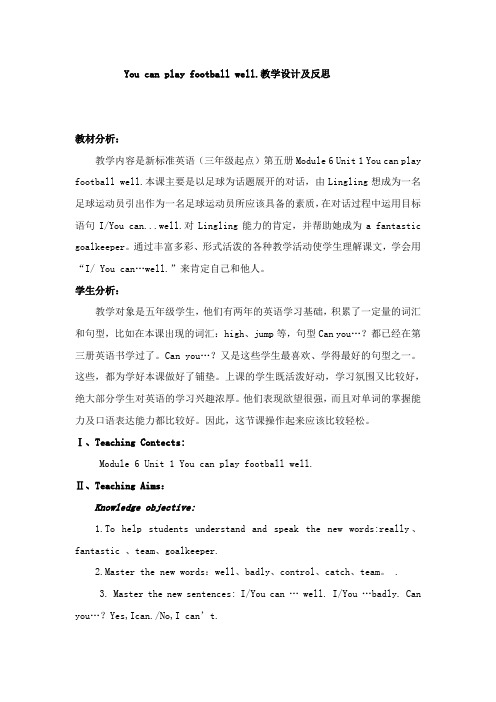
You can play football well.教学设计及反思教材分析:教学内容是新标准英语(三年级起点)第五册Module 6 Unit 1 You can play football well.本课主要是以足球为话题展开的对话,由Lingling想成为一名足球运动员引出作为一名足球运动员所应该具备的素质,在对话过程中运用目标语句I/You can...well.对Lingling能力的肯定,并帮助她成为a fantastic goalkeeper。
通过丰富多彩、形式活泼的各种教学活动使学生理解课文,学会用“I/ You can…well.”来肯定自己和他人。
学生分析:教学对象是五年级学生,他们有两年的英语学习基础,积累了一定量的词汇和句型,比如在本课出现的词汇:high、jump等,句型Can you…?都已经在第三册英语书学过了。
Can you…?又是这些学生最喜欢、学得最好的句型之一。
这些,都为学好本课做好了铺垫。
上课的学生既活泼好动,学习氛围又比较好,绝大部分学生对英语的学习兴趣浓厚。
他们表现欲望很强,而且对单词的掌握能力及口语表达能力都比较好。
因此,这节课操作起来应该比较轻松。
Ⅰ、Teaching Contects:Module 6 Unit 1 You can play football well.Ⅱ、Teaching Aims:Knowledge objective:1.To help students understand and speak the new words:really、fantastic 、team、goalkeeper.2.Master the new words:well、badly、control、catch、team。
.3. Master the new sentences: I/You can … well. I/You …badly. Can you…?Yes,Ican./No,I can’t.Skill objectives:1.Can use the new words in the real situations.2.Can use the sentences “I/You can … well. I/You …badly.” to make self-assessment and evaluation of others.Emotional objectives:1.To help students certainly the advantages of others and correct understanding of their own.2. To develop students’ interest in English learning.Ⅲ、Key points:1. Master the new words and use it in the real situations.2. Master the new sentences and can use it to make self-assessment and evaluation of others.Ⅳ、Difficult points:1.To help students tell the different between catch and control.2. To help students work in pairs.Ⅴ、Teaching Aid:computer, tape recorder, drill cards ,a footballⅥ、Teaching Approaches:TPR, Communicative approach, have a competition.Ⅶ、Teaching ProcedureStep1、Warm-up1.Greeting:Good morning,boys and girls.2.Do some TPR:(I say and you do) Review the phrases: watch TV, run fast, jump high, play football…【设计意图:通过师生问候,拉近师生间的距离。
外研版五年级英语上册Module 6 Unit 1 You can play football well 2

点拨:否定答语为 “No, he can’t. ”是来回答Can he…? 问句的。
.
4. I’m your ___f_ir_s_t __ (one/first) fan.
点拨:first是序数词,意为“第一”。
5. You can jump ___re_a_l_ly__ (really/real) high. .
( A ) 2. I want ________ in your team.
A. to be
B. to
C. be
( C ) 3. —Can you eat it all?
—________
A. Yes, I do. B. Yes, I am. C. Yes, I can.
点拨:Can you…?问句的肯定回答为 “Yes, I/we can.”。
What do you think of...? 你认为……怎么样?
知识点
fantastic /fæn'tæstɪk/ adj. 极好的 例句: Lingling is a fantastic goalkeeper.
玲玲是一个极好的守门员。 发音: 单词中的两个a 都发/æ/。 近义词: excellent 极好的
Module 6 Unit 1 You can play football well.
Look listen and say.
Can he play basketball?
Oh,he can play it well!
知识点
Can he play basketball? 他会打篮球吗?
句型结构:Can+ 主语+ 动词(短语)原形? 用来询问 某人是否会……。
外研版小学五年级上册英语教案(全册)
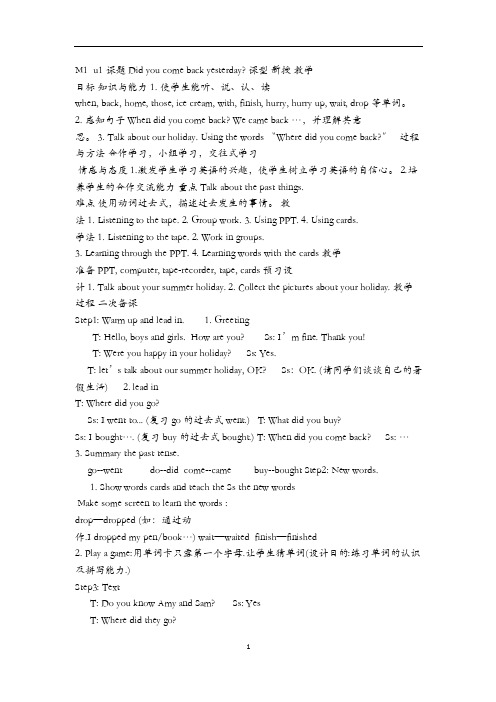
M1 u1 课题 Did you come back yesterday? 课型新授教学目标知识与能力 1. 使学生能听、说、认、读when, back, home, those, ice cream, with, finish, hurry, hurry up, wait, drop等单词。
2. 感知句子When did you come back? We came back …,并理解其意思。
3. Talk about our holiday. Using the words 〝Where did you come back?〞过程与方法合作学习,小组学习,交往式学习情感与态度 1.激发学生学习英语的兴趣,使学生树立学习英语的自信心。
2.培养学生的合作交流能力重点 Talk about the past things.难点使用动词过去式,描述过去发生的事情。
教法 1. Listening to the tape. 2. Group work. 3. Using PPT. 4. Using cards.学法 1. Listening to the tape. 2. Work in groups.3. Learning through the PPT.4. Learning words with the cards 教学准备 PPT, computer, tape-recorder, tape, cards 预习设计 1. Talk about your summer holiday. 2. Collect the pictures about your holiday. 教学过程二次备课Step1: Warm up and lead in. 1. GreetingT: Hello, boys and girls. How are you? Ss: I’m fine. Thank you!T: Were you happy in your holiday? Ss: Yes.T: let’s talk about our summer holiday, OK? Ss:OK. (请同学们谈谈自己的暑假生活) 2. lead inT: Where did you go?Ss: I went to... (复习go的过去式went.) T: What did you buy?Ss: I bought…. (复习buy的过去式bought.) T: When did you come back? Ss: …3. Summary the past tense.go--went do--did come--came buy--bought Step2: New words.1. Show words cards and teach the Ss the new wordsMake some screen to learn the words :drop—dropped (如:通过动作.I dropped my pen/book…) wait—waited finish—finished2. Play a game:用单词卡只露第一个字母.让学生猜单词(设计目的:练习单词的认识及拼写能力.)Step3: TextT: Do you know Amy and Sam? Ss: YesT: Where did they go?When did they come back?Listen carefully and answer the questions.T play the tape recorder, Ss listen and answer the questions. Play again, read after the tape. Do the exercises. Choose T or F.( ) 1. Lingling is in London with Sam and Amy. ( ) 2. They are back yesterday. ( ) 3. T hey came back yesterday. ( ) 4. john lives near Amy and Sam. Check the answer. Work in groups. Try to act the text out. Ask some group act in class. Step4: SurveyAsk you Ss and fill in the form Where did you go? What did you by?When did you come back? Step5: Summery Step6: HomeworkDo the form after class. When did you … ?Name Leave Come back【板书设计】 unit1 Did you come back yesterday? go—went Did you come back yesterday? buy—bought We came back last Sunday. do—did finish—finished come—came wait—waited drop—droppedModule 1 Unit 2 We bought ice creams.教学目标 1、语言知识 ---Did you …? ---Yes,I did./No,I didn’t. 2、语言技能能运用Did you …?句型询问对方是否做过某事,对方根据具体情况作出应答 Yes,I did./No,I didn’t.培养学生在具体情景中正确运用该语言的交际能力。
五年级上册英语教案-Module6Unit1Youcanplayfootballwell外研版

教案五年级上册英语教案Module6 Unit1 You can playfootball well 外研版一、教学目标1. 知识与技能目标:学生能够理解、掌握并熟练运用句型“You can”“I can”来描述自己和其他人的能力。
2. 过程与方法目标:通过听力练习、角色扮演、小组讨论等活动,提高学生的英语听、说、读、写能力,培养他们的合作意识和交际能力。
3. 情感态度与价值观目标:激发学生学习英语的兴趣,培养他们积极乐观、自信的态度,提高他们的跨文化交际意识。
二、教学内容1. 词汇:football、basketball、volleyball、badminton、table tennis、play、well等。
2. 句型:You can、I can、Can you? Yes, I can./No, I can't.3. 功能:描述自己和其他人的能力。
三、教学重点与难点1. 教学重点:掌握词汇和句型,能够用英语描述自己和其他人的能力。
2. 教学难点:正确运用情态动词can,熟练运用句型描述能力。
四、教具与学具准备1. 教具:PPT、录音机、磁带、黑板、粉笔等。
2. 学具:英语课本、练习册、笔、纸等。
五、教学过程1. 导入:通过图片、歌曲等形式,引导学生复习与运动相关的词汇,为新课的学习做好铺垫。
2. 新课呈现:利用PPT展示本节课的主要句型和词汇,教师进行讲解和示范,学生跟读并模仿。
3. 练习:通过听力练习、角色扮演、小组讨论等形式,让学生熟练掌握句型和词汇。
4. 巩固:进行课堂小结,检查学生对本节课内容的掌握情况,针对学生的薄弱环节进行强化训练。
5. 作业布置:布置适量的课后作业,让学生巩固所学知识。
六、板书设计1. Module6 Unit1 You can play football well2. 词汇:football、basketball、volleyball、badminton、table tennis、play、well等。
外研版五英上教学课件 M6 Unit1 You can play football well

You can play football well.
Amy: Lingling, do you want to be in our football team? Lingling: Yes, I do. But I don't play well. Sam: Can you run fast? Lingling: No, I can’t. Sam: Can you pass the ball well? Lingling: Not very well.
Amy: But you can jump really high. You’re very good at basketball. Lingling: Yes, I am. Sam: And you can catch the ball well. Lingling: Yes, I can. Sam: So you can be a good goalkeeper. Lingling: Yes, I think I can do that well. Amy:Hooray! Lingling, you’re a fantastic goalkeeper. Sam:You can play football well, Lingling. Lingling:Thank you.
Read after tape.
(跟录音读)
Read
together. (齐读)
…
What can he do?
run fast
What can he do?
jump high
What can he do?
catch the ball well
well 好地
Let’s chant
外研版五年级上册英语全册教案及教学反思
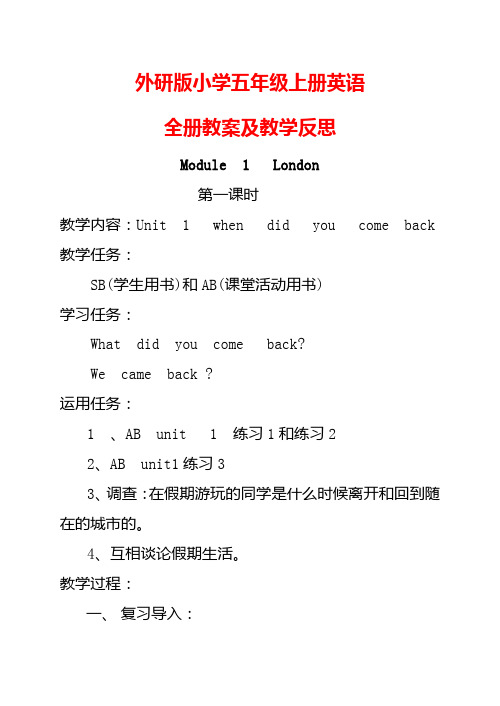
外研版小学五年级上册英语全册教案及教学反思Module 1 London第一课时教学内容:Unit 1 when did you come back 教学任务:SB(学生用书)和AB(课堂活动用书)学习任务:What did you come back?We came back ?运用任务:1 、AB unit 1 练习1和练习22、AB unit1练习33、调查:在假期游玩的同学是什么时候离开和回到随在的城市的。
4、互相谈论假期生活。
教学过程:一、复习导入:1、出示星期名称卡片,提问:What day is today?It‘s Sunday.2、由此引入新课。
二、课文导入:1、教师可通过与学生交流,了解学生的假期生活。
提问:How was your summer vacation ? Where did you go on summer vacation? When did you come back?I (we)came back last Sunday?2、下面,我们讲听到Ling ling Sam 和 Amy的对话,看看他们为我讲述什么故事。
(进入课文学习)3、指导学生看图,理解:Lingling和谁在一起,他们在哪儿,遇到了谁,他们在干什么?4、教师一边指导学生看图,一边帮助学生了解课文内容。
5、画出本课的新单词,教读单词。
6、听课文录音,跟读课文。
7、完成运用任务1:AB unit 1 练习1 和练习28、完成运用任务2:学生观察几幅小图,根据图1及句子提示,使用正确的动词的一般过去式来完成句子的填空。
三、课后作业。
全班完成AB unit1练习4.第二课时教学内容:Unit 2 Did they buy ice cream 教学任务:SB(学生用书)和AB(课堂活动用书)学习任务:Did youYes I did / No I didn’t功能:谈论过去发生的事情活活动运用任务:1 、AB unit2 练习42、AB unit12练习53、游戏:猜一猜你的同学上个星期都做了什么。
潜江市XX小学五年级英语上册Module6Unit1Youcanplayfootballwell教学

You can play football wellModule 6Unit 1 You can play football well.本节课的内容是新标准三年级起始第五册第六模块第一单元 You can play football well.整节课教师很好地贯彻了英语教学提倡的交际性原则,并且运用了多种教学手段及方法以达到教学目标,也能很好地调动学生的学习积极性与学习兴趣。
下面我们谈一下对这节课的看法,首先谈一下这节课中的亮点:1、教师的教学热情很高涨,充分调动课堂气氛。
课堂气氛是通过师生间相互作用和同学间的相互影响而表现出来的一种群体心理状态。
建立和谐的人际关系是优化课堂气氛的重要条件之一,而教师与学生的关系是课堂人际关系的主要方面。
教师真诚的爱生态度和行为对于和谐的师生关系极为重要。
如果教师在课堂上对每个学生都抱着热情、积极、信任的态度,并在教学过程中使学生感受到这种态度,那么,全班学生的学习积极性就会受到鼓励,从而产生良好的课堂气氛。
2、导入部分新颖自然,易让学生接受。
课堂教学的导入,是教师在新的教学内容或活动开始时引导学生进入学习的行为方式。
导入是课堂教学的一个有机组成部分,是实际教学的前奏,起着“引子”的作用。
组织好一堂课的开端,可以抓住学生、控制课堂,促进学生积极思维的作用。
利用有趣的图片和足球来激发学生的兴趣,导入新单词,让学生很自然的描述他们的情况。
3、教学思路清晰,活动形式多样。
为了帮助学生构建和发展认知结构,教师必须善于鼓励学生积极参与并设计英语教学活动,包括思维参与和行为参与,这需要学生全身心的投入和体验。
通过感知、体验、实践、参与和合作等方式实现任务目标,感受成功。
同时,在学习过程中不断地进行情感和策略上的调整,形成积极的学习态度与主动的学习方式,促进语言实际应用能力的提高。
4 、另外,老师的本身基本功也很扎实。
教态放松,带有比较夸张的语言,表情及动作,比较能吸引学生的注意力。
外研版小学英语(一年级起点)五年级上册【同步练习】Module 10 Unit 1
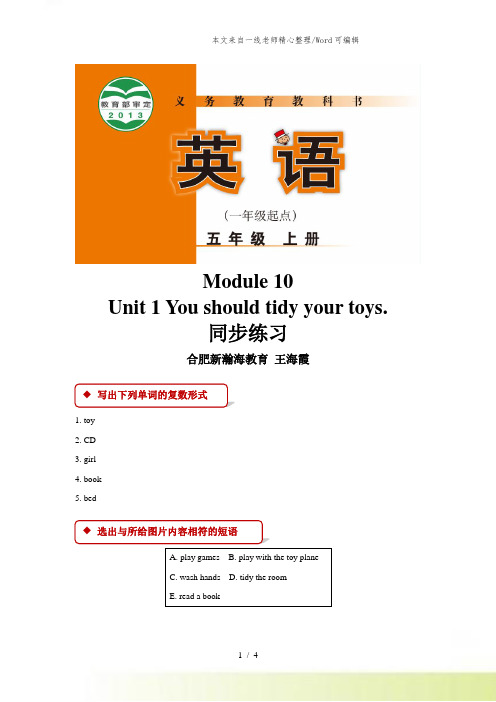
Module 10Unit 1 You should tidy your toys.同步练习合肥新瀚海教育王海霞◆写出下列单词的复数形式1. toy ________2. CD ________3. girl ________4. book ________5. bed ________◆选出与所给图片内容相符的短语A. play gamesB. play with the toy planeC. wash handsD. tidy the roomE. read a book( ) 1.( ) 2.( ) 3.( ) 4.( ) 5.◆连词成句◆1. a What girl beautiful______________________________________________________________________________!2. play You with shouldn’t fire______________________________________________________________________________.3. should bed You your make______________________________________________________________________________.4. You at bed should to 9 go______________________________________________________________________________.5. English should practise day You every______________________________________________________________________________.◆用should和shouldn’t填空,补全对话A: Wake up!B: What’s the time?A: It’s 6 o’clock. You 1.________ get up now.B: I’m tired.A: You 2.________ watch TV for that long time. You 3.________ finish your homework first. Today, you will have an exam. You 4.________ be late.B: I know, Mum. Where are my black shoes?A: They’re under the sofa. You 5.________ leave them anywhere.1. ________2. ________3. ________4. ________5. ________◆单项选择( ) 1. _____ make the room a mess.A. Don’tB. DoC. Will( ) 2. Thanks _____ your help.A. toB. ofC. for( ) 3. _____ a good boy.A. HowB. WhatC. Which( ) 4. You shouldn’t _______ that.A. doB. doesC. doing参考答案◆写出下列单词的复数形式1. toys2. CDs3. girls4. books5. beds◆选出与所给图片内容相符的短语1. D2. B3. C4. E5. A◆连词成句1. What a beautiful girl2. You shouldn’t play with fire3. You should make your bed4. You should go to bed at 95. You should practise English every day◆用should和shouldn’t填空,补全对话1. should2. s houldn’t3. should4. shouldn’t5. shouldn’t◆单项选择1. A2. C3. B4. A。
小学英语_Module6 Unit1 You can play football well.教学设计学情分析教材分析课后反思
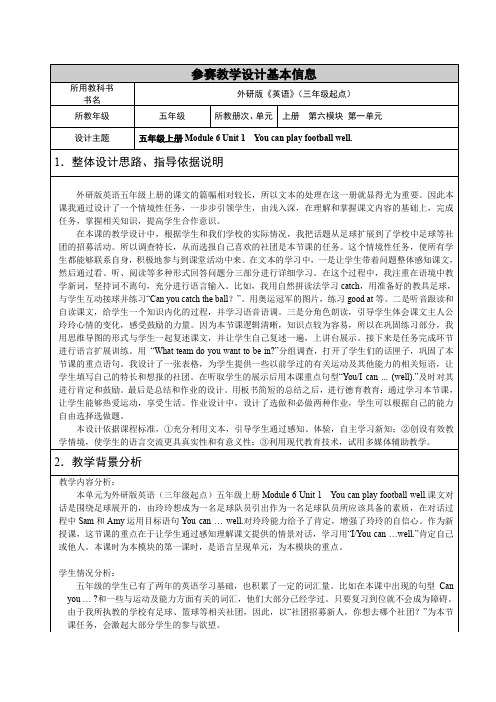
3.教学目标分析语言知识目标:掌握well, , 会认读really, catch, fantastic,team,fan。
语言技能目标:能听懂会说有关运动与能力方面的单词并学会运用You/I can …well.肯定自己或他人。
语言运用目标:能运用You/I can …well.肯定自己或他人。
文化意识目标:在You/I can …well.的学习中体会鼓励的力量,能够正确认识和肯定自己和他人。
情感态度目标:倡导同学们爱运动,爱生活。
学习策略目标:小组合作策略4.教学重点、难点分析教学重点:本课重点在于如何用You/I can …(well).肯定自己或他人。
本课将以句型为中心进行听说训练,使学习和操练更有效。
教学难点:能理解catch,fantastic,goalkeeper的意思并能读准发音。
本课将对这些单词进行操练,动静结合,帮助学生更好地理解单词的含义。
5.教学过程设计Step1:Warming up and lead-in.1 Greetings.T: Hello,boys and girls.T: Today,let’s learn Module6 Unit1 You can play football well.2 分组并画简笔画。
T:I want to divide you into two groups. Groups girls and group boys. If you do a good job,I will give you a star.3 做游戏(sharp eyes).T: Now stand up and do actions. Let me see who has the sharp eyes.(课件迅速依次出示各种运动图片,学生起立,大声说出并做动作。
)(设计意图:通过做游戏,激发了学生上课的热情,活跃课堂气氛,同时,复习了相关知识。
)4 问答引入活动一。
